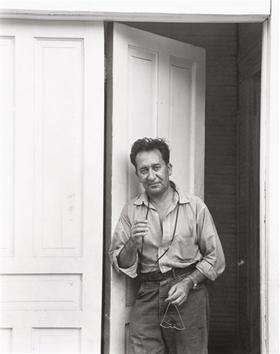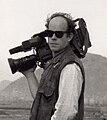
Terence Patrick O'Neill was a British photographer, known for documenting the fashions, styles, and celebrities of the 1960s. O'Neill's photographs capture his subjects candidly or in unconventional settings.

Aaron Siskind was an American photographer whose work focuses on the details of things, presented as flat surfaces to create a new image independent of the original subject. He was closely involved with, if not a part of, the abstract expressionist movement, and was close friends with painters Franz Kline, Mark Rothko, and Willem de Kooning.

Rory Peck was a Northern-Irish freelance war cameraman who was killed while covering the events of the 1993 Russian constitutional crisis.
James Brolan was a British freelance journalist and television sound technician, who was killed while working for CBS News in Baghdad, Iraq. Just one month before he was killed in Iraq, Brolan, as part the CBS News team that covered the 2005 Kashmir earthquake, received the 2005 Overseas Press Club Award—the David Kaplan Award for Best Television Spot News Reporting From Abroad.

The Frontline Club is a media club and registered charity created by Vaughan and Pranvera Smith, located near Paddington Station in London. With a strong emphasis on conflict reporting, it aims to champion independent journalism, provide an effective platform from which to support diversity and professionalism in the media, promote safe practice, and encourage both freedom of the press and freedom of expression worldwide.
Roddy Scott was an English freelance photojournalist who documented neglected conflicts in such places as Sierra Leone, Yemen, Iraq, Afghanistan and Ethiopia. He derived the bulk of his income from updating The World's Most Dangerous Places and traveled widely in his freelance journalism career, usually without sponsors or payment.
Digital Photography Review, also known as DPReview, is a website about digital cameras and digital photography, established in November 1998. The website provides comprehensive reviews of digital cameras, lenses and accessories, buying guides, user reviews, and forums for individual cameras, as well as general photography forums. The website also has a database with information about individual digital cameras, lenses, printers and imaging applications. Originally based in London, Digital Photography Review and most of its team relocated to Seattle, Washington, in 2010. It was owned by Amazon from 2007 to 2023.
Sean Langan is a British journalist and documentary film-maker. Langan works in dangerous and volatile situations; including environments noted for war, conflict and civil unrest. In 2008 he was kidnapped along with his translator while filming in the Afghanistan-Pakistan border region. They were freed three months later after Langan's family had negotiated their release.
Henry Vaughan Lockhart Smith is a British video journalist. He ran the freelance agency Frontline News TV and founder of the Frontline Club in London. The Guardian has described him as "a former army officer, journalist adventurer and rightwing libertarian."

Clancy Charles Arcade Chassay is an English writer, director, actor, and journalist. He has covered conflict zones across the world for various British news outlets, including The Guardian, The Economist, The Independent, The Sunday Telegraph, and the BBC. He has produced and directed documentaries for Channel 4 and Guardian Films in Afghanistan, Lebanon, Myanmar, Israel, the Palestinian Territories, the United States, and Chechnya. He now works as a director and screenwriter.
Sir John Welleseley Gunston, 3rd Baronet is the third Baronet of Wickwar in the County of Gloucestershire in the Baronetage of the United Kingdom. He is perhaps better known for his exploits as a photographer in Afghanistan in the 1980s.
The Rory Peck Award is an award given to freelance camera operators who have risked their lives to report on newsworthy events. It was set up in 1995 and is named after the Northern Irish freelance cameraman Rory Peck, who was killed while reporting on the siege of the Moscow White House in 1993. The award is organised by The Rory Peck Trust. Both were set up in 1995 by Peck's widow Juliet Peck and his friend John Gunston, in order to provide support and help to freelancers. The Rory Peck Trust is now an internationally recognized organization that supports freelancers' rights and enables them to work safely.
John D McHugh is an Irish photojournalist and filmmaker, and is based in London, England.
Tara Sutton is a Canadian journalist and filmmaker whose work in conflict zones has received many awards. She was one of the first international television correspondents to both produce and shoot their own reports and is a pioneer in the field of "video journalism".

David Loyn has been a foreign correspondent since the late 1970s, mostly with the BBC. He is an authority on Afghan history.
Sean Smith is a British photographer and filmmaker. He has covered conflicts and wars in Iraq, Afghanistan, Lebanon and Democratic Republic of the Congo. He has been on staff at The Guardian newspaper since 1988. His work in the UK has dealt with inner-city disturbances of the 1980s, heroin users and the lives of professional wrestlers, among other subjects.
William John Monk was a South African, known for his photographs of a Cape Town nightclub between 1967 and 1969, during apartheid. In 2012 a posthumous book was published, Billy Monk: Nightclub Photographs.

Mirwais Jalil, was an Afghan journalist for the BBC World Service near Kabul, Afghanistan. Jalil has been praised for being crucial in the BBC's coverage of the Afghanistan civil war and as a highly credible journalist. On 29 July 1994, he was returning from an interview with Prime Minister Gulbuddin Hekmatyar when masked men kidnapped him, and Jalil was found murdered the next morning outside of Kabul. Jalil's aggressive coverage of the civil war between the mujahedeen was seen as authoritative and is said to be the reason of his fate.

Marcel Mettelsiefen is a German documentary filmmaker, cinematographer and producer. His documentaries have earned him critical appraisal and recognition. Among others, he has won four BAFTA awards and four Emmy awards, and was nominated for an Oscar in 2017 for Watani: My Homeland in the category of Best Documentary Short. In 2023, he won two BAFTA's for Children of the Taliban. In the same year, In Her Hands, was nominated for three Emmy awards, and won the award for Outstanding Politics & Government Documentary.











